Police Wed Nov 26 2014
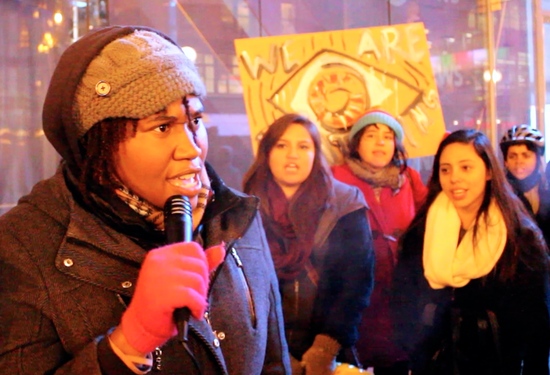
Chay, an organizer with BYP 100 Chicago, speaks out against police militarization and brutality at a Tuesday evening rally in downtown Chicago. Photo by Emily Brosious.
Hundreds of demonstrators took to the streets in downtown Chicago Tuesday evening to protest a Missouri grand jury's decision not to indict Ferguson police officer Darren Wilson for killing unarmed teenager Michael Brown.
The march began around 6:30 p.m., after police ordered protesters off City Hall's fifth-floor, where they had been staging a planned 28-hour sit-in outside Mayor Rahm Emanuel's office.
Continue reading this entry »
— Emily Brosious
Civics Tue Nov 25 2014
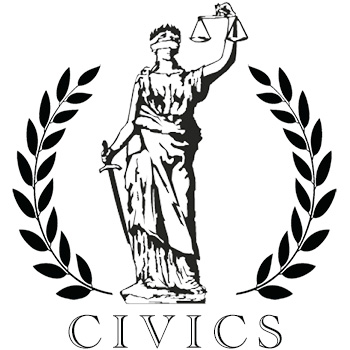 A vulnerable population and common violations of Constitutional rights. It is precisely the type of scenario where courts should be able to intervene to stop abuses. Yet because of legislative inaction and Supreme Court case law, courts are paradoxically unable to play a part in stemming ongoing injustice.
A vulnerable population and common violations of Constitutional rights. It is precisely the type of scenario where courts should be able to intervene to stop abuses. Yet because of legislative inaction and Supreme Court case law, courts are paradoxically unable to play a part in stemming ongoing injustice.
When can a police officer use deadly force to prevent a person from fleeing -- or to "seize" them, under the meaning of the Fourth Amendment? In Chicago, there are three levels of rules that determine this: first at the highest level, there are the Supreme Court decisions in Garner v. Tennessee and Graham v. Connor. These decisions together create the constitutional limit on the use of deadly force. Basically, they hold that for an officer to use deadly force but not to violate the Fourth Amendment's protection of individuals from unreasonable searches and seizures, they must have an objectively reasonable belief that they or the public are in imminent danger of bodily harm, or have probable cause to believe that the person committed a serious, violent felony (burglary would be insufficient) and they are fleeing. The effect of these decisions was that in most states, laws that defined a justifiable homicide committed by a police officer were unconstitutional to the degree that they permitted any use of force in excess of the constitutional limit.
In Illinois, at the second level of rule-making, this rule for deadly force is codified at 720 ILCS 5/7-5, in the criminal code. It states that a police officer is justified in using force likely to cause death or great bodily harm only when he reasonably believes that such force is necessary to prevent death or great bodily harm to himself or another person, or when he reasonably believes both that,
(1) Such force is necessary to prevent the arrest from being defeated by resistance or escape; and
(2) The person to be arrested has committed or attempted a forcible felony which involves the infliction or threatened infliction of great bodily harm or is attempting to escape by use of a deadly weapon, or otherwise indicates that he will endanger human life or inflict great bodily harm unless arrested without delay....
Continue reading this entry »
— Ramsin Canon /
By Dave Stieber
While we all prepare to give thanks for family, friends, and loved ones, I want to pause and give thanks to the people in this city who are relentlessly trying to give us all the opportunity to have an elected school board.
Because Mayor Rahm Emanuel keeps Chicago the only school district in the entire state of Illinois that does not have an elected school board.
We have a school board that is handpicked by the mayor and therefor does whatever the mayor tells them to do, because if they go against him then guess what? They are no longer on the school board.
Continue reading this entry »
— Mechanics /
Justice Wed Nov 19 2014
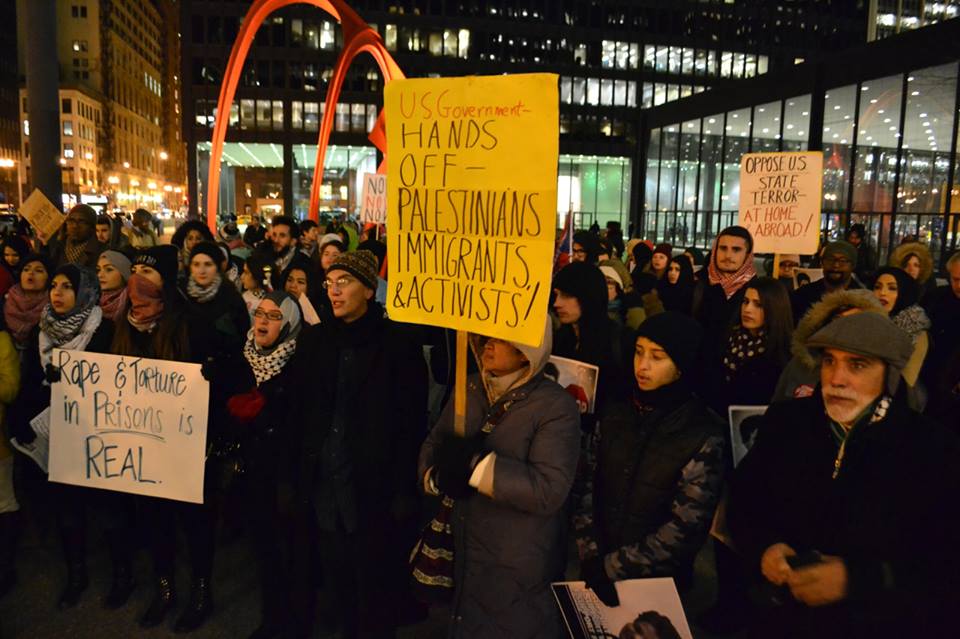 #FreeRasmeaNow Protestors Gather at Federal Plaza on Wednesday Photo credit: Rasmea Odeh Defense Committee
#FreeRasmeaNow Protestors Gather at Federal Plaza on Wednesday Photo credit: Rasmea Odeh Defense Committee
Rasmea Yousef Odeh, 67, was convicted last Monday of immigration fraud by a jury in federal court in Detroit. Odeh, a resident of Evergreen Park and the Associate Director at the Arab American Action Network in Chicago was previously convicted of involvement in fatal terrorist bombings and sentenced to life in prison in Israel in 1970. Reports later surfaced that her confession was forced after torture by the Israeli military while Odeh was in captivity.
Odeh spent 10 years in prison before being released with 78 others in prisoner exchange with the Popular Front for the Liberation of Palestine. In 1995, Odeh came to the US through Jordan in 1995, where she (according to her later federal indictment) denied that she had ever been convicted of a crime.
The results of Odeh's trial (an arrest in which she'll be detained until her sentencing, facing up to ten years in prison, deportation, and loss of her U.S. citizenship on March 15, 2015) sparked nationwide support in a number of ways, including the National Week of Action to #FreeRasmeaNow.
The Committee is taking action by writing letters to the judge and planning protests--one of which included chaining themselves to the U.S. Federal Court building in Oakland. Last Wednesday in Chicago, hundreds of supporters rallied at the Federal Plaza for the first protest in Odeh's home city since her arrest.
Hatem Abudayyeh, spokesperson for the National Rasmea Defense Committee, which includes over 50 organizations across the U.S., said, "The government's case, an immigration charge, is nothing but a pretext."
"Rasmea's story is the story of millions of Palestinians, and of millions of freedom-loving defenders of justice everywhere," Abudayyeh continued, "Her eventual victory will be a victory for Palestine and for all the people's movements across the world."
— Becky Schultz
Civics Tue Nov 18 2014
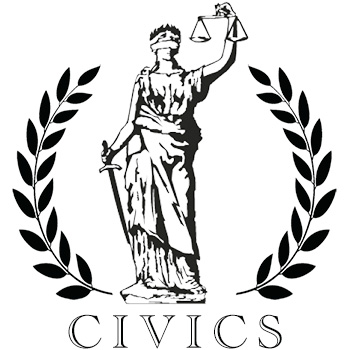 The entrepreneurial government, once a promising and slick vehicle for change, has lost that new governance philosophy-smell. What was once seen as nimble has become ossified. America's cities are facing the problems of a new millennium as new generations come of age, facing new challenges. Since at least the early 1990s, big city governments have reoriented to a philosophy of governance rooted in free-market and entrepreneurial principles. In the early 1990s, this orientation for urban administration was described as "the New Public Management" by academics like Peter Aucoin. This entrepreneurial government philosophy was meant to replace the egalitarian and "rules-oriented" aspirations of reformers beginning in the 1970s. Recently, the word "neoliberal" has been thrown around, often imprecisely, to describe this ideology. But that word isn't quite accurate.
The entrepreneurial government, once a promising and slick vehicle for change, has lost that new governance philosophy-smell. What was once seen as nimble has become ossified. America's cities are facing the problems of a new millennium as new generations come of age, facing new challenges. Since at least the early 1990s, big city governments have reoriented to a philosophy of governance rooted in free-market and entrepreneurial principles. In the early 1990s, this orientation for urban administration was described as "the New Public Management" by academics like Peter Aucoin. This entrepreneurial government philosophy was meant to replace the egalitarian and "rules-oriented" aspirations of reformers beginning in the 1970s. Recently, the word "neoliberal" has been thrown around, often imprecisely, to describe this ideology. But that word isn't quite accurate.
The type of government we've had in Chicago, and cities following Chicago's lead, is something very specific: giving individual leaders and small groups of leaders in cities broad discretion to set policy, akin to the managerial powers of corporate executives, as a means to achieve efficiency--efficiency in competition for capital investment and efficiency in provisioning services to the public. Its features have been well studied and explicated [PDF]: budget cuts, "accountability," privatization, consumer models, labor flexibility, and a hostility to politics vis a vis management (i.e., technocracy).
In a world opened up by the easier movement of capital across borders, elite city leadership figured they had to be lean to compete. This then-new philosophy saw self-management by professionals (like teachers and health care workers), rule-bound agencies, and egalitarian aspirations as inefficient, because by their nature, these processes are slow. It couldn't move at the pace of business at a time business was striking for better deals, or fleeing altogether. To keep and lure capital and talent, decision-makers couldn't be bound by exacting rules--whether those were workplace rules in the form of collective bargaining agreements, "due process" rules, or procedural safeguards meant to guarantee inclusion of underrepresented and underserved people.
Continue reading this entry »
— Ramsin Canon /
News Mon Nov 17 2014
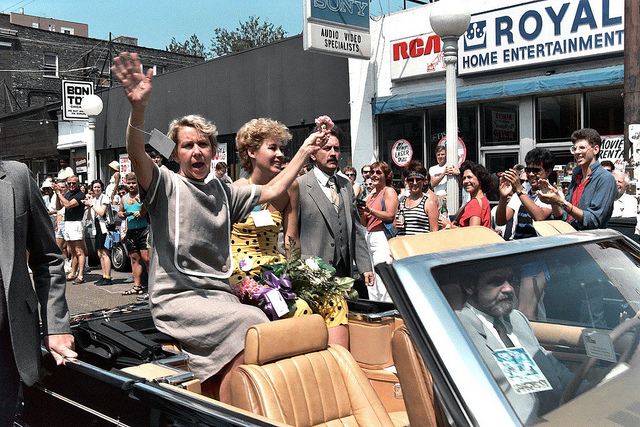
Jane Byrne in the 1985 Gay and Lesbian Pride Parade. Photo by Alan Light.
Jane Byrne was a fighter.
She was sacked by Mayor Michael Bilandic from her position as the commissioner of consumer sales, weights and measures and then ran against him and went on to defeat The Machine and become Chicago's first and only female mayor.
After she was defeated in the mayoral primary in 1983 she ran for mayor two more times, losing the primaries both times.
Byrne, who died on Friday morning at the age of 81, was a woman who loved her city and strove to improve it.
Continue reading this entry »
— Monica Reida
 Chicago Public School enrollment dropped by around 3,000 this year, contributing to a total loss of 6,000 students in the district since 2012. For the first time since 1970, CPS enrollment has fallen below 400,000.
Chicago Public School enrollment dropped by around 3,000 this year, contributing to a total loss of 6,000 students in the district since 2012. For the first time since 1970, CPS enrollment has fallen below 400,000.
This loss of students stems from failures by the Emanuel and Daley administrations that go beyond education policy alone. Both our current and previous mayors have focused resources downtown and in wealthy business districts. This has come at the direct expense of low-income families living in neighborhoods City Hall consistently neglects. As housing costs have soared, the social safety net shriveled, and neighborhood schools have been closed or consistently cut back, many low-income families have chosen to move out of the city.
"I knew my daughter couldn't get the quality education that she deserved in our neighborhood schools," explained Zerlina Smith, a single mother living in the West Side community of Austin. When it came time to send her daughter Cherish to pre-K, Smith was alarmed at the lack of resources at her neighborhood public school, Oscar DePriest, which at the time was on the list of schools set to be shuttered by the Emanuel administration. But Smith was not ready to give up on CPS completely. "I chose to send her 16 miles away from our home to Maria Saucedo, which is a scholastic academy and a level one school with an abundance of resources."
Continue reading this entry »
— Rachel Anspach









 The entrepreneurial government, once a promising and slick vehicle for change, has lost that new governance philosophy-smell. What was once seen as nimble has become ossified. America's cities are facing the problems of a new millennium as new generations come of age, facing new challenges. Since at least the early 1990s, big city governments have reoriented to a philosophy of governance rooted in free-market and entrepreneurial principles. In the early 1990s, this orientation for urban administration was described as "the
The entrepreneurial government, once a promising and slick vehicle for change, has lost that new governance philosophy-smell. What was once seen as nimble has become ossified. America's cities are facing the problems of a new millennium as new generations come of age, facing new challenges. Since at least the early 1990s, big city governments have reoriented to a philosophy of governance rooted in free-market and entrepreneurial principles. In the early 1990s, this orientation for urban administration was described as "the 
 Chicago Public School enrollment
Chicago Public School enrollment 



